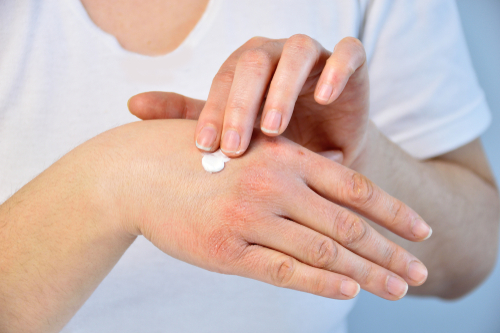Topical remetinostat gel significantly reduces itching in patients with a kind of cutaneous T-cell lymphoma called mycosis fungoides, data from a Phase 2 trial shows.
The medicine also reduced the severity of skin lesions in these patients, meeting in a prior analysis the trial’s primary goal.
The findings were released at the recent International Investigative Dermatology (IID) 2018 meeting, in Orlando, in a presentation titled “Anti-pruritic properties of remetinostat (SHAPE), a topical histone deacetylase inhibitor (HDACi); data from a randomized phase 2 study in patients with stage IA- IIA mycosis fungoides.”
Remetinostat, formerly known as SHAPE, is being developed by Medivir for the treatment of cutaneous T-cell lymphoma (CTCL), a rare form of blood cancer that shows up first in the skin.
The medicine is a HDAC inhibitor meant to reduce these skin manifestations and the significant itching they cause. HDAC is a protein that affects the activity of certain genes.
While systemic HDAC inhibitors have already been approved for late-stage CTCL, they are not recommended for early-stage patients due to adverse effects. Remetinostat’s topical formulation is expected to avoid most of these side effects.
The Phase 2 trial (NCT02213861) included 60 patients with stages IA, IB and IIA mycosis fungoides (MF). Stage IA involves 10% or less of skin; stage IB involves more than 10% of skin; and stage IIA has stage IA or B skin involvement with additional limited involvement of lymph nodes.
Participants were divided into three groups of 20, and treated with either 0.5% gel twice daily, 1% gel once daily, or 1% gel twice daily for up to 12 months.
In a prior analysis, the company showed that 40% of patients receiving the 1% gel twice daily experienced a significant reduction in the severity of their skin lesions. Itching was also reduced in 80% of patients.
Now, researchers reported updated data of remetinostat’s effects on itching symptoms. The amount of itching was measured using a visual analogue scale (VAS).
At the trial’s start, 24 patients had significant itching: six in the first dose group, eight in the second, and 10 in the third. Responses were seen in 50%, 37.5%, and 80% of these patients, respectively.
In general, the first signs of improvement were seen after a mean of 71 days, with no major differences between dose groups.
Among patients treated with 1% gel twice daily, four experienced itching reduction for at least nine months, compared to two of those who given 1% gel once a day. Patients with stage IB and IIA disease were more likely to have better responses to treatment, the researchers noted.
“These data demonstrate a potential benefit of topical remetinostat treatment in terms of a clinically meaningful reduction in pruritus [itching], for patients with MF-CTCL, importantly without the typical systemic effects of oral or intravenous HDAC inhibitors,” the researchers wrote.
Medivir is now in discussions with the U.S. Food and Drug Administration to initiate a Phase 3 trial in CTCL.


